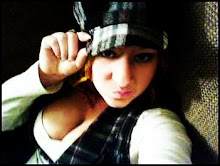Why, Stephanie Meyer, why?
Why can’t I put Twilight on a shelf and let it sit there like a normal book?

What subliminal messages have you slipped into the angst-filled narratives that compel me to re-read your books ad nauseum?
I have nothing in common with teen vampires or werewolves, and I have a stack of books waist-high in my study, some of which I’ve been on the wait-list to get for months.
I also have a husband and plenty of things I need to be doing. Laundry, exercising, cooking, cleaning, showering, figuring out how my dog got a black eye, etc. And yet, each spare minute finds me delving deeper into the Edward and Bella saga, despite the fact that I’ve read the entire series at least five times.
The dialogue annoys me with its simplicity and unrealistic cleanliness. (These are teenagers, hon, and nobody knows more than they do about how to drop the f-bomb into everyday convo. They can make the word a noun, verb, adjective, adverb, alliteration, hell, probably even an acronym. Yet all your characters deliver, despite being tracked by bloodthirsty immortals, is Bella’s not-so-endearing, “Holy crow!”)

I am simply confounded by the degree of my obsession.
Even the movies are addictive, though I look at Robert Pattinson and see only Cedric Diggory in dire need of a hairbrush. (JK baby, we’ll get to you in another post. You’ve taken literature as crack rock to a whole other level).

The script (and book) are pretty flimsy on developing the initial relationship between Edward and Bella, but hey, Shakespeare didn’t give Romeo and Juliet a whole lot of time to declare themselves for all eternity, either, and it doesn’t seem to have hurt his sales.
The entire Twilight phenomenon is enough to drive a person insane.
As I sit typing, the piano melody of Bella’s lullaby from the movie is stuck on repeat in my head.
While better than, say, “Tiptoe through the Tulips,” “Copa Cabana,” or “Sexy Back,” it’s still driving me to distraction.
Why, though?
What is so special about this story?
What elements of the formula for successful literature has dear Stephanie used?
Let’s examine:
Denial of self, denial of nature. Star-crossed lovers. A vulnerable woman (girl, really) and an invincible man (physically, at least) who is also possessed of an uncommon sensitivity and a sense of honor, duty, and humility that can only have come from an early 20th century upbringing. We’ve also got fantastic parlor tricks—mind reading, predicting the future, being able to manipulate the emotions in a room. And these are just the extras, in addition to everyone’s super-human speed, strength, agility, grace, beauty, hearing, and oh, let’s not forget, immortality.
What’s not to like?
She’s also included that all-time favorite device of the writer, the love triangle. Oh, and in this case, the underdog is actually a, well, dog. Both guys in the triangle have that other bestselling quality—the bad-guy persona. Everybody’s gorgeous and either wears designer duds from Paris (the Cullens) or runs around ripped and half-naked (Jacob and pack).
In the Cullen family, there’s a vampire for everybody.
Carlisle represents culture, perseverance, self-denial, and inherent goodness.

Esme is largely glossed over, but she represents strong maternal urges and a huge heart, and in the movie version, reminds us she’s the chick with amnesia from Grey’s Anatomy.

Rosalie is the classic bitter beauty (though with good reason).

Emmett is the guy’s guy. I mean, the dude hunts grizzlies. You can’t get more Bear Grylls than that.

Alice represents the quirky, and Jasper the reformed.


As for bad guys, they’re present in spades. The Volturi eat Chuck Norris for breakfast and Jack Bauer for dessert. ‘Nuff said.

There’s something for the spiritual person, too. All this talk of souls and whether the vampires will go to hell kind of smacks you in the face with it, but there are some subtler things as well. Once bitten, it takes three days to make the transformation from human into vampire and then to rise again.
Three days.
Anyone?
Bueller?
Bueller?
Alice’s abilities put her in the role of prophet, and the very nature of the vampires and the wolves inspires thought about the ability of a character to be both fully human and fully other at the same time. Which leads to thoughts on the nature of Christ.

Another major theme is abstinence.
At first, it’s from a purely practical perspective, as intimacy with Edward might very well kill Bella, but in the later books, Meyer makes a point of having the characters want to wait for marriage.
Going back to the formula, all this pent-up sexual desire, frustration, romantic angst, and the sheer logistical impossibility of an Edward/Bella pairing versus the relative ease of a Jacob/Bella scenario practically guarantee that readers will want the impossible to happen.

Perhaps Stephanie Meyer just thought of a good story and told it, and I’m blowing it way out of proportion. But I’d be disappointed to think so.
Also, don’t get me wrong. I love these books, and I’m not faulting her for being formulaic. I’m just jealous that I haven’t written a bestselling quartet of vampire books.
And more than slightly ticked off that her appallingly appealing vampires have rendered me incapable of putting her books down long enough to write the bestseller that could possibly be lurking somewhere in my own brain.
Why can’t I put Twilight on a shelf and let it sit there like a normal book?

What subliminal messages have you slipped into the angst-filled narratives that compel me to re-read your books ad nauseum?
I have nothing in common with teen vampires or werewolves, and I have a stack of books waist-high in my study, some of which I’ve been on the wait-list to get for months.
I also have a husband and plenty of things I need to be doing. Laundry, exercising, cooking, cleaning, showering, figuring out how my dog got a black eye, etc. And yet, each spare minute finds me delving deeper into the Edward and Bella saga, despite the fact that I’ve read the entire series at least five times.
The dialogue annoys me with its simplicity and unrealistic cleanliness. (These are teenagers, hon, and nobody knows more than they do about how to drop the f-bomb into everyday convo. They can make the word a noun, verb, adjective, adverb, alliteration, hell, probably even an acronym. Yet all your characters deliver, despite being tracked by bloodthirsty immortals, is Bella’s not-so-endearing, “Holy crow!”)

I am simply confounded by the degree of my obsession.
Even the movies are addictive, though I look at Robert Pattinson and see only Cedric Diggory in dire need of a hairbrush. (JK baby, we’ll get to you in another post. You’ve taken literature as crack rock to a whole other level).

The script (and book) are pretty flimsy on developing the initial relationship between Edward and Bella, but hey, Shakespeare didn’t give Romeo and Juliet a whole lot of time to declare themselves for all eternity, either, and it doesn’t seem to have hurt his sales.
The entire Twilight phenomenon is enough to drive a person insane.
As I sit typing, the piano melody of Bella’s lullaby from the movie is stuck on repeat in my head.
While better than, say, “Tiptoe through the Tulips,” “Copa Cabana,” or “Sexy Back,” it’s still driving me to distraction.
Why, though?
What is so special about this story?
What elements of the formula for successful literature has dear Stephanie used?
Let’s examine:
Denial of self, denial of nature. Star-crossed lovers. A vulnerable woman (girl, really) and an invincible man (physically, at least) who is also possessed of an uncommon sensitivity and a sense of honor, duty, and humility that can only have come from an early 20th century upbringing. We’ve also got fantastic parlor tricks—mind reading, predicting the future, being able to manipulate the emotions in a room. And these are just the extras, in addition to everyone’s super-human speed, strength, agility, grace, beauty, hearing, and oh, let’s not forget, immortality.
What’s not to like?
She’s also included that all-time favorite device of the writer, the love triangle. Oh, and in this case, the underdog is actually a, well, dog. Both guys in the triangle have that other bestselling quality—the bad-guy persona. Everybody’s gorgeous and either wears designer duds from Paris (the Cullens) or runs around ripped and half-naked (Jacob and pack).
In the Cullen family, there’s a vampire for everybody.
Carlisle represents culture, perseverance, self-denial, and inherent goodness.

Esme is largely glossed over, but she represents strong maternal urges and a huge heart, and in the movie version, reminds us she’s the chick with amnesia from Grey’s Anatomy.

Rosalie is the classic bitter beauty (though with good reason).

Emmett is the guy’s guy. I mean, the dude hunts grizzlies. You can’t get more Bear Grylls than that.

Alice represents the quirky, and Jasper the reformed.


As for bad guys, they’re present in spades. The Volturi eat Chuck Norris for breakfast and Jack Bauer for dessert. ‘Nuff said.

There’s something for the spiritual person, too. All this talk of souls and whether the vampires will go to hell kind of smacks you in the face with it, but there are some subtler things as well. Once bitten, it takes three days to make the transformation from human into vampire and then to rise again.
Three days.
Anyone?
Bueller?
Bueller?
Alice’s abilities put her in the role of prophet, and the very nature of the vampires and the wolves inspires thought about the ability of a character to be both fully human and fully other at the same time. Which leads to thoughts on the nature of Christ.
Stephanie was a Utahn... BYU... The whole nine yards..
Then we have the constant narrative of self-sacrifice threading through the stories, in an especially powerful way for Bella. Her willingness to quite literally shed her own blood to help those she loves …
Well, hell. I meant for this to be funny, not to turn into a book report. Maybe Twilight actually does have some literary merit. (You can take the English lover out of the classroom, but you can’t take the classroom out of the English lover. Sorry!)
Then we have the constant narrative of self-sacrifice threading through the stories, in an especially powerful way for Bella. Her willingness to quite literally shed her own blood to help those she loves …
Well, hell. I meant for this to be funny, not to turn into a book report. Maybe Twilight actually does have some literary merit. (You can take the English lover out of the classroom, but you can’t take the classroom out of the English lover. Sorry!)

Another major theme is abstinence.
At first, it’s from a purely practical perspective, as intimacy with Edward might very well kill Bella, but in the later books, Meyer makes a point of having the characters want to wait for marriage.
Going back to the formula, all this pent-up sexual desire, frustration, romantic angst, and the sheer logistical impossibility of an Edward/Bella pairing versus the relative ease of a Jacob/Bella scenario practically guarantee that readers will want the impossible to happen.

Perhaps Stephanie Meyer just thought of a good story and told it, and I’m blowing it way out of proportion. But I’d be disappointed to think so.
Also, don’t get me wrong. I love these books, and I’m not faulting her for being formulaic. I’m just jealous that I haven’t written a bestselling quartet of vampire books.
And more than slightly ticked off that her appallingly appealing vampires have rendered me incapable of putting her books down long enough to write the bestseller that could possibly be lurking somewhere in my own brain.





Rob Pattinson would NOT be hot without Edward being a part of who he is. Just saying.
ReplyDelete